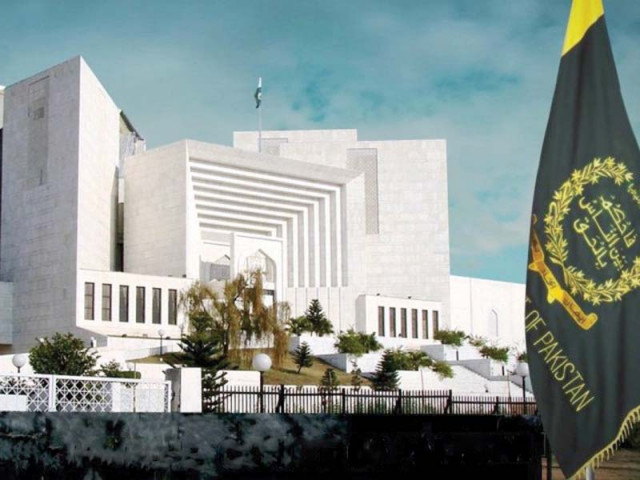Hudabiya Paper Mills: SC seeks details of 17-year-old money laundering case
Says Ishaq Dar’s confessional statement from 2000 is a piece of evidence not yet used

PHOTO: EXPRESS
Hudabiya Paper Mills case came to the limelight when the five-judge bench headed by Justice Asif Saeed Khosa took up the PTI’s plea for the disqualification of Finance Minister Ishaq Dar on the charges of facilitating the Sharif family in alleged money laundering of Rs1.2 billion.
Highlighting apparent lacunae in acquittal of the Sharif family in Hudabiya Paper Mills case by the Lahore High Court (LHC) in 2014, the SC wondered how Rs1.2 billion were still ‘unaccounted for’ and why the National Accountability Bureau (NAB) did not file any appeal against the LHC verdict.
On April 25, 2000 – just months after a military coup that toppled Nawaz Sharif’s second government – Dar, who was incarcerated then, recorded a confessional statement in which he claimed that Sharif brothers used the Hudabiya Paper Mills as cover for money laundering during the late 1990s.
An accountability court was hearing the case which in 2007 adjourned it sine die. Later, when Sharif family returned to Pakistan after exile, the court issued a notice to them to join the proceedings. The accused persons approached the LHC against the accountability court’s proceedings against them.
In 2012, the LHC’s division bench ordered for quashing the reference against Sharif family. However, both judges gave diversion on the point related to the reinvestigation of case by NAB.
The matter was referred to a referee judge for giving final verdict on that point. In 2014, the referee judge held that the matter against Sharif family cannot be reinvestigated.

Interestingly, NAB did not challenge the LHC’s judgment in the apex court. The PTI in its present petition has requested the SC to direct NAB for filing appeal against the high court’s order.
Shahid Hamid, counsel for finance minister, stated that after the 1999 coup Dar remained imprisoned for 23 months. “However, despite all its efforts NAB could not find anything against him during Musharraf’s regime,” he said.
He requested the bench to give final ruling over the allegations against his client as he has been facing ‘false cases’ since 1992, adding that now this matter be ended and he should be given a clean-chit.
Upon this, Justice Khosa asked whether any court has ever considered merit of the case against him (Dar). He also observed that Dar’s confessional statement was a piece of evidence, which has not been utilised so far.
When the counsel stated that the Islamabad High Court (IHC) had recently rejected the petition seeking Dar’s disqualification, the bench questioned whether it was a friendly fire by the petitioner as the high court dismissed his plea because he did not attach the confessional statement.
Justice Khosa observed that NAB chairman was appointed during the present regime with the mutual consent of leader of opposition and leader of house (PM) and the NAB chairman apparently did not move appeal against the LHC’s order in favour of the latter (PM) and his family members.
The judge said Rs1. 2 billion is still unaccounted for because of the LHC’s judgment. He also observed that the LHC’s referee judge gave judgment on the basis of section 26-E of NAB law.
The said section says any statement made before [a magistrate] by a person who has accepted a tender of pardon may be given in evidence against him at [the] trial.
Justice Khosa observed it was critical to know when the pardon was granted. If pardon was granted to Dar before his confessional statement then it would be considered as the statement of accused. “However, if the pardon was granted after the confession then it would be considered as the statement of prosecution witness,” he said.
Later, the bench asked NAB’s Prosecutor General Waqas Kabir Dar to inform on Monday when pardon was granted and whether it was conditional or unconditional. Another member of the bench Justice Ejaz Afzal Khan observed that if the pardon was granted then it will have implications.
Referring to the Oil and Gas Regulatory Authority (Ogra) scam case, Justice Khosa observed that when NAB did not file appeal against the IHC’s order in that matter, the top court while exercising its jurisdiction under Article 184 (3) entertained the matter.
“The high court cannot block the SC in exercising its jurisdiction under Article 184 (3) of the Constitution,” he added.
Hamid told the bench that the Federal Investigating Agency (FIA) had registered two FIRs against members of Sharif family in 1994. But the challan was quashed and both the accused were acquitted by the LHC in May 1997.
However, the bench expressed wonder how the challan could be quashed by the high court.
The ruling party’s legal experts are unhappy with Hamid for giving lengthy arguments on this point. They believe that it is a weak side of Sharif family’s case; therefore, he should have avoided the judges’ queries by giving brief submissions. The PTI chief Imran Khan was visibly excited during the proceedings.
At the start of hearing, the PM’s counsel Makhdoom Ali Khan requested the bench to give time for submitting documents regarding the distribution of properties and assets after the demise of Mian Muhammad Sharif, the PM’s father, in 2004. The hearing of case is adjourned till Monday.
Published in The Express Tribune, January 28th, 2017.



















COMMENTS
Comments are moderated and generally will be posted if they are on-topic and not abusive.
For more information, please see our Comments FAQ